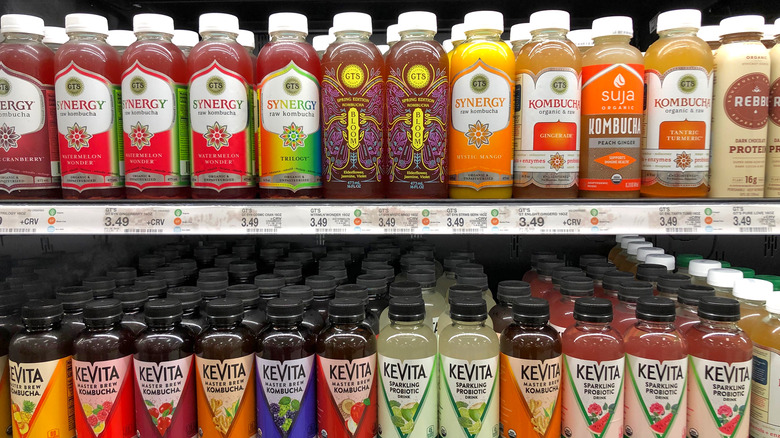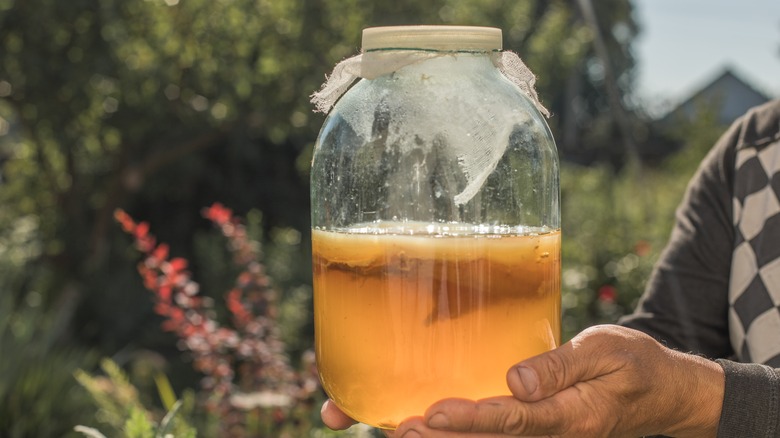Is It Safe To Drink Kombucha Every Day?
Kombucha has been championed as a health-boosting superfood in recent years. More brands of the trendy beverage line grocery aisles than ever before. But, what's all the hype about, and what exactly is kombucha?
Kombucha is a fizzy fermented tea packed full of probiotics. The flavor is slightly acidic and appeals to a more particular palette than an ordinary can of soda. (Think other fermented favorites: kimchi, yogurt, tempeh, sauerkraut.) Dietitian Maxine Smith, RD, LD of the Cleveland Clinic, sings the health benefits of kombucha's unique probiotic makeup. She defines probiotics as "live bacteria and yeasts or 'healthy little microbes' that benefit your digestive system." According to Health-Ade, one of the forerunning kombucha brands, gut health doesn't just deal with congestion; gut health also affects your immune system, stress, skin, energy levels, mood, and feelings.
Another major kombucha producer, JuneShine, explains the key ingredients that earned kombucha its masthead as a health elixir: "It's typically made from tea, organic honey, and SCOBY, a symbiotic culture of bacteria and yeast, which all ferments together." SCOBY can also aid in detoxifying the liver, which is an especially notable feature considering kombucha also contains trace amounts of alcohol (about 0.5%-3%). For reference, according to Alcohol By Volume, the average can of beer contains about 5% alcohol.
But, can too much of a good thing be a bad thing? When you grab that aesthetically-pleasing, earth-toned glass bottle before a day out, is it safe to drink it all? Or to reach for it every day?
Keep an eye on sweeteners
Like its superpowers, kombucha's drawbacks also lie in its key ingredients. Some brands add higher amounts of sugar to counteract the trademark fermented taste and make the beverage more palatable for unaccustomed consumers. Health-Ade Kombucha contains 2 grams of sugar per 8 fluid ounce serving which, considering there are two servings per bottle, totals at 4 grams per bottle. Synergy Kombucha contains 6 grams of sugar per 8 fluid ounce serving of 12 grams per bottle.
This can seem a bit on the higher end, considering Medical News Today recommends the sugar intake for adults to be no greater than 25-38 grams daily. Juneshine Kombucha also cautions, "This tea contains a specific carbohydrate called FODMAPs that cause digestive issues in some people, especially those with IBS." Reading the nutrition label before you buy can make a dramatic difference in how much sugar your probiotic-rich drink packs. Also, keep your eyes peeled for brands featuring natural sweeteners.
The sweet spot
Kombucha also contains a small, but notable amount of caffeine. Like sugar content, though, these levels can vary dramatically between brands. For example, Synergy Kombucha contains 4-7mg of caffeine per 8 fluid ounces, Brew Dr. Kombucha contains 7.5 mg, and KeVita contains 40mg. Caffeine is linked to feelings of jitteriness, difficulty falling asleep, and, most notably, bloating – the opposite of what a gut-healthy beverage aims to accomplish. The Mayo Clinic recommends that adults (with no underlying medical conditions) consume no more than 400 milligrams (mg) of caffeine a day. Considering this, a person would have to drink gallons of kombucha daily to exceed their recommended caffeine intake. So, kombucha checks out here.
What is the sweet spot between avoiding sugar overload while still reaping the probiotic benefits of kombucha? The CDC offers numbers: 4 ounces of kombucha can be safely consumed 1-3 times a day. So, in total, no more than 12 ounces (330mL) per day. However, most kombucha brands bottle their product in 16-20 fluid ounce bottles, so you've already surpassed the suggested limit if you finish a single bottle. Sticking to one full bottle every other day is a safe way to ensure your probiotics are up, your acid levels are even, and your sugar intake is right on track for a healthy day.


